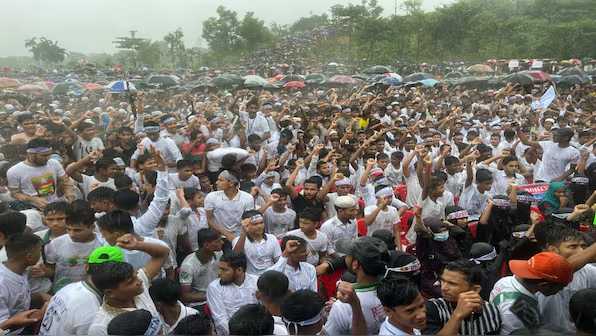Rohingya Refugees Mark 7 Years Away From Home, Seek Safe Return to Myanmar
Aug 25, 2024 / GMT+6
Rohingya refugees in Bangladesh mark seven years since fleeing Myanmar. They seek a safe return to Rakhine State. The UN and rights groups are concerned.
More topics for you...This topic continues below.
China reports record $1.2 trillion trade surplus for 2025, defying Trump's tariffs.
Tens of thousands of Rohingya refugees in Bangladesh recently observed a somber anniversary. On August 25, they remembered seven years since their harrowing escape from Myanmar.
The gathering took place at Kutupalong camp in Cox's Bazar, one of the world’s largest refugee settlements. Despite heavy rain, refugees turned out in force, holding banners that read "Hope is Home" and "We Rohingya are the citizens of Myanmar."
The day, known as "Rohingya Genocide Day," is a poignant reminder of their suffering.
The 2017 Crisis
The crisis began on August 25, 2017, when Myanmar’s military launched a harsh crackdown in Rakhine State. The violence followed attacks by an insurgent group on military guard posts.
In retaliation, the military carried out severe attacks on Rohingya villages, including killings, burning of homes, and sexual violence. This brutality forced hundreds of thousands of Rohingya to flee to Bangladesh, seeking safety across the border.
The scale of the crisis was immense. In just a few months, more than 700,000 Rohingya refugees arrived in Bangladesh. This was in addition to over 300,000 Rohingya who had already sought refuge in Bangladesh from earlier violence.
The influx put a huge strain on the country’s resources. Bangladesh responded by opening its borders and providing shelter to those in need.
Efforts to return the refugees to Myanmar have faced many obstacles. Bangladesh has tried twice to negotiate their repatriation.
The government has urged the international community to pressure Myanmar to create safe conditions for return. Prime Minister Sheikh Hasina has sought help from China to mediate the situation, but these efforts have not yet led to a solution.
Escalating Conflict in Myanmar
The situation in Myanmar’s Rakhine State has become even more unstable. Fighting between Myanmar’s military and the Arakan Army has increased.
The Arakan Army, an insurgent group, has clashed with the military, leading to more violence and displacement. More Rohingya have fled to Bangladesh in search of safety.
International Concerns
The UN and various human rights organizations have expressed deep concern. Refugees International reported that both the military and the Arakan Army are targeting Rohingya civilians. Villages have been bombed, and homes destroyed.
UNICEF has highlighted the severe impact on children and families, who are caught in the crossfire. The violence has led to injuries and deaths, making it difficult for aid groups to provide help.
The Urgent Need for Peace
As the Rohingya refugees mark seven years away from their homes, the crisis remains unresolved. The ongoing violence and instability in Myanmar highlight the urgent need for a peaceful solution.
The international community continues to call for action to ensure the safety and dignity of the Rohingya people and to support their return to their homeland under safe conditions. The plight of the Rohingya underscores the broader challenges of displacement and the need for global unity in addressing humanitarian crises.







